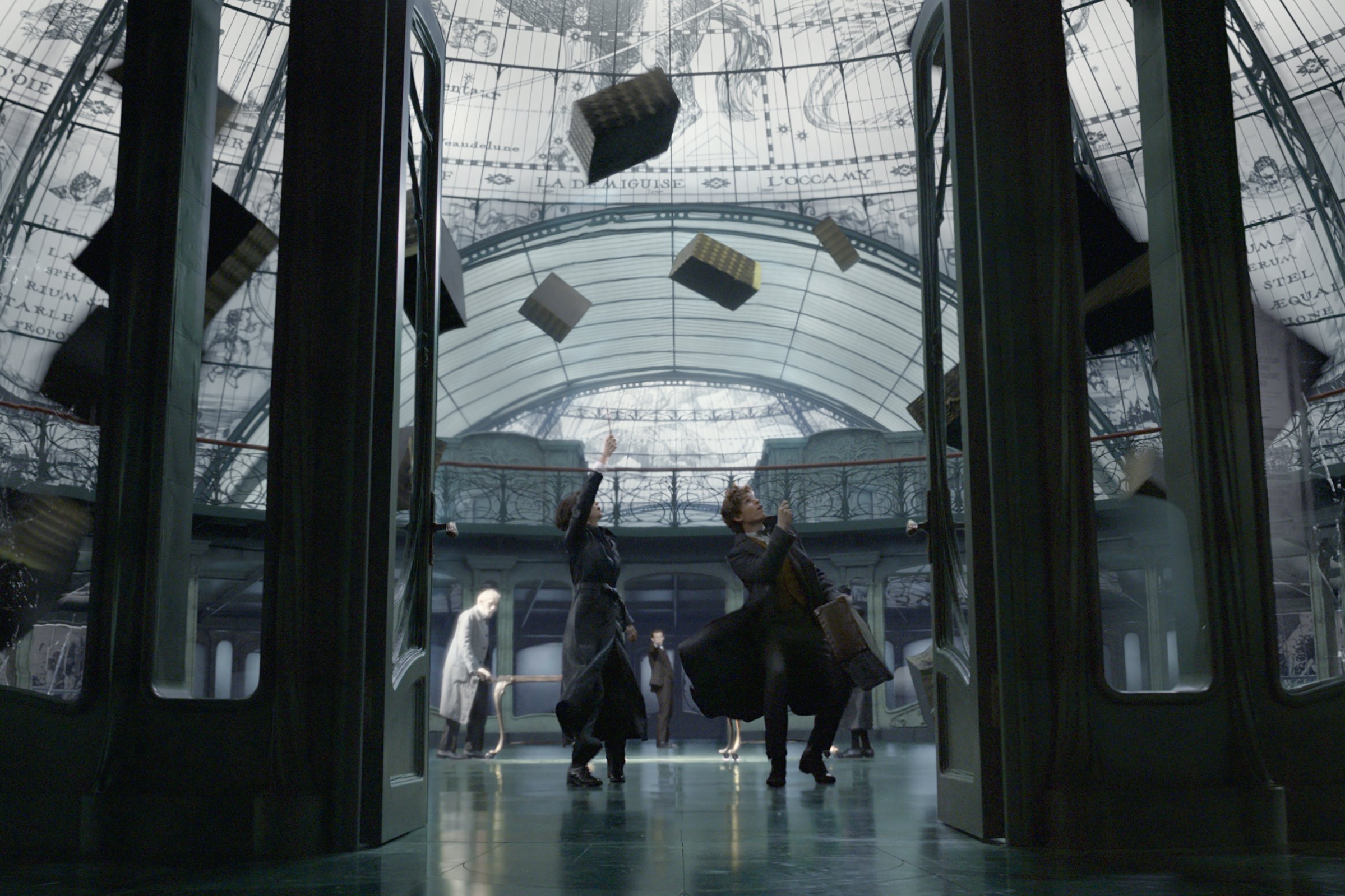
Swearing the entire cast and crew of a film to secrecy is hard. But when it’s a massive movie like Fantastic Beasts: The Crimes of Grindelwald, with some 700 people and 1,000 costumes–including 400 coats alone–it’s next to impossible. All precautions are taken: characters are given code names, minute details are protected by nondisclosure agreements, and digital scripts are encrypted and disappear after a certain amount of time. It’s not quite magic, but it’s close.
The pressure to not reveal anything–even by accident–is enough to give Eddie Redmayne heart palpitations. “I’ve been sent this hilarious document which is covered with double-caps, triple-underlined notes saying, You can’t talk about this,” says the Oscar winner, who returns as wizard Newt Scamander in the sequel, out Nov. 16. We’re sitting in his spotless trailer at Warner Bros. Studio in Hertfordshire, just north of London, around three months into production. Does he ever tell anyone? He leans in and admits, a little bashfully, that he does: his wife, Hannah Bagshawe.
It certainly helps that J.K. Rowling is the master of keeping secrets. She famously claims to have known crucial plot points from her best-selling book series’ endgame years in advance. And Johnny Depp’s controversial casting–the actor has been accused of domestic violence by his ex-wife Amber Heard–as the dark wizard Grindelwald was kept under wraps until just two weeks before the first film came out in 2016.
Bearing this commitment to secrecy in mind, it’s no surprise that Rowling has entrusted very few with details about how the remaining three movies in the proposed five-part series will play out. Even producer Tim Lewis, who has worked on eight Harry Potter installments, is in the dark. “We haven’t seen scripts for the next one,” he says. “I am assuming [Rowling] knows the whole plan–but I couldn’t say.”
The stakes are high enough: the first Fantastic Beasts movie raked in $814 million. That’s a number most studios would dream about, but when it comes to Harry Potter, expectations start sky-high. In a world filled with universes based on existing intellectual property–Star Wars, Marvel–franchise fatigue is always possible. But for now, the mania shows no sign of letting up: Harry Potter and the Cursed Child, a play based on an idea by Rowling, is a critical and commercial smash. For the Beasts sequel, analysts are already predicting an opening weekend of $65 million to $75 million.
On the enormous Beasts set, designed to look like 1920s Paris, everything is perfectly in order. I stroll down a full high street lined with shops, including a magical pharmacy called Elixir, a wand store and a butcher with slabs of “meat” hanging from the ceiling. Even the tablecloths and plates in a charming bistro are artfully dirty.
That’s not quite the case in the less-than-spotless trailer of Ezra Miller, who plays the mysterious orphan Credence Barebone. Plates of half-eaten food sit on most surfaces. His character–a wizard with a parasitical magical force–requires interacting with sophisticated motion-sensor technology to cultivate a physical language. “[Whatever I’m doing] I’m going to fall into an imagination rabbit hole and be wherever the script says I am,” says Miller. “I am constantly repeating the playtime process of falling into pocket-size dimensions and staying there for a while, and then at some point hopefully popping out.” Playing a dark force comes easily to Miller, whose troubled character’s search for his identity is central to the new movie’s closely guarded plot.
For Miller, who grew up reading the books, working with Rowling is the realization of a childhood fantasy. “She is such a seminal writer,” he says. “This is one of the projects where I would never even think to improvise or abbreviate a line.” When the film opens, legions of Potter fans will join Miller to have their magical universes widened once more. But for now, the mysteries of the film belong only to the people making it.
More Must-Reads From TIME
- The 100 Most Influential People of 2024
- The Revolution of Yulia Navalnaya
- 6 Compliments That Land Every Time
- What's the Deal With the Bitcoin Halving?
- If You're Dating Right Now , You're Brave: Column
- The AI That Could Heal a Divided Internet
- Fallout Is a Brilliant Model for the Future of Video Game Adaptations
- Want Weekly Recs on What to Watch, Read, and More? Sign Up for Worth Your Time
Write to Kate Samuelson at kate.samuelson@time.com